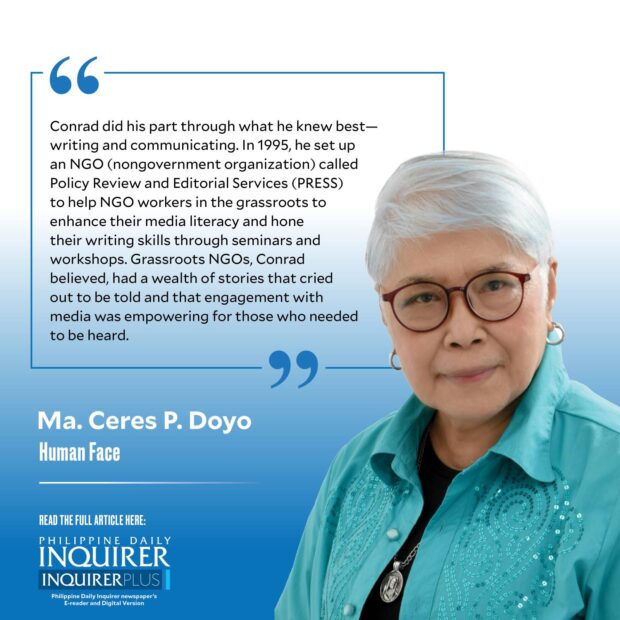For CDQ, a tribute

In the quiet morning of last week, the Philippine Daily Inquirer offered Mass and held a tribute for revered and sorely missed columnist Conrado de Quiros who passed away on Nov. 6, 2023. He was 72. Sorely missed because he stopped writing nine years ago after a health condition disabled him. Sorely missed because we learned that people who did not know him personally except for his writing, the once-young who had vivid remembrances of the column pieces he had written, came to pay their last respects. And there were the countless admirers and friends of his from his generation, nocturnal beings who trooped to his wake, to sing, celebrate, and reminisce.
The Inquirer solemnly held its own and in mid-morning at that, but members of Conrad’s family were there, still groggy from the previous nights’ gatherings, to acknowledge our admiration and loss.
I was one of those tasked to deliver a few words. Here, with your indulgence:
To the family of Conrad de Quiros—Tita, Miranda, Jose Miguel, his next of kin, colleagues in the Inquirer, friends, good morning.
I stand here before you out of holy obedience—if I may invoke a spiritual virtue—because I feel unworthy of having to speak and extol a celebrated writer and columnist not in my league of commoners.
I am not in Conrad’s inner circle of friends but several of my friends are, persons whose friendship with him go back a long way—friends who knew his ins and outs, habits, pet peeves, preferences, weaknesses, if you may—food, music, books—what made him tick. I am only one of his numerous fans, and only after he died, when my mind’s eye was scanning the Inquirer’s op-ed page where he was a regular face and voice four times a week for 23 years, did I realize that I was now occupying the space, the hole in the trenches, he had occupied, which is beside the editorial. Not that it means anything. Please do laugh. I only landed there because of the rearrangement in the op-ed section.
The last time I saw Conrad up close was during the wake some years ago for Bishop Julio X. Labayen, a Carmelite, bishop of the Infanta Prelature, champion of the oppressed during the dark years of the Marcos dictatorship. Conrad came in a wheelchair, hardly able to utter a word because of his health condition. I was struck by his presence, by his eagerness to come and pay his last respects to a holy man, a voice in the wilderness who loved the poor and the dispossessed of food and freedom.
Conrad, too, was a voice in the wilderness. Speaking of the oft-forgotten sector (PDO, we called them in those times, the subversive, politically correct way to mean poor, deprived, and oppressed), Conrad did his part through what he knew best—writing and communicating. In 1995, he set up an NGO (nongovernment organization) called Policy Review and Editorial Services (PRESS) to help NGO workers in the grassroots to enhance their media literacy and hone their writing skills through seminars and workshops. Grassroots NGOs, Conrad believed, had a wealth of stories that cried out to be told and that engagement with media was empowering for those who needed to be heard.
When asked to join PRESS’ board, I said yes because Conrad headed it. Soon after, I found myself often called upon to help in the writing workshops where, indeed, I discovered stories that needed to be written and made known, added to those I had discovered on my own.
What more can I say, so much have already been said about Conrad/CDQ and his writing, unparalleled in its style and force—the elegant prose, the stinging wit. Profound, belligerent, irreverent, in-your-face tirades against those drunk with power. In it all was the unmistakable spark of humanity that his words exuded.
(For those in awe of CDQ’s writings, another collection of his pieces should go between book covers. In her tribute, associate publisher Juliet Javellana stressed that CDQ personified the other half of the paper’s “Balanced News, Fearless Views” slogan.)
As they say, the proof of the pudding is in the eating, so may I read to you the last paragraph of his ground-breaking book that only a CDQ could have written, “Dead Aim: How Marcos Ambushed Philippine Democracy,” written at the behest of our Inquirer founding chair Eugenia Apostol and published by the Foundation for Worldwide People’s Power which she established. Here’s a taste of creative nonfiction. Note the magical realism:
“It would happen one night, when the stars were bright and the world was still. A massing of nuns and whores, priests and beggars, merchants and medicine men, the sick and the whole, the sellers of cures for the body and the sellers of cures for the soul. One peaceful night, the axe would fall with a suddenness that would surprise even those who swung it. There would be no resistance from the Palace. The vaunted armies of martial law would evaporate so fast as the vapors in the night with the coming of day. The tanks would roll to a stop, the barrels of soldiers’ guns rendered as mute as Plaza Miranda, and the rolls and rolls of barbed wire wrenched off the heart of the nation. Martial law would be over. And it would all seem so—easy.”
—————-
Send feedback to cerespd@gmail.com




















